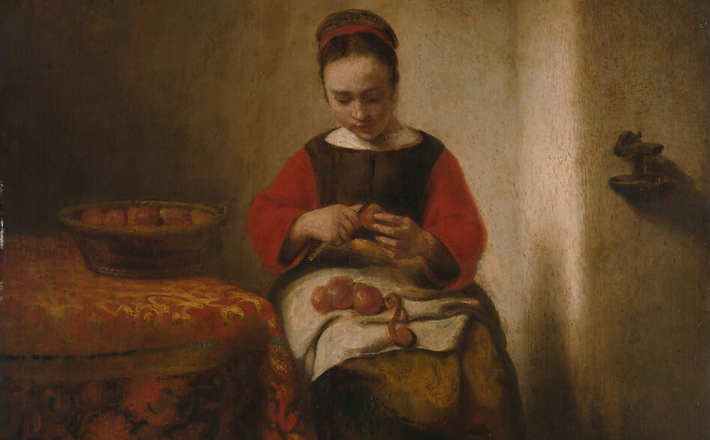Commentary on Genesis 18:1-10a
Genesis 18:1–10 tells the story of the Lord appearing to Abraham by the oaks of Mamre. But rather than coming with thunder or fire, God shows up in the form of three travelers—ordinary, embodied visitors who stand nearby, receive food, and speak a quiet but life-changing promise. On the surface, the story may seem simple: a moment of hospitality in a desert tent.
But when read in light of Pentecost—the moment when the Holy Spirit was poured out on the church—this passage takes on deeper meaning. It reveals something central to God’s character and to the Christian life: that God meets us not in distant power, but in closeness, in our ordinary lives, and in the very flesh-and-blood realities we often overlook.
The first striking thing about this passage is how God chooses to reveal himself. He doesn’t speak from the heavens or send angels in shining garments. He comes as three human figures—mysterious, but familiar. They stand nearby, they wait, and they are received.
This matters because it shows that God comes near, not as an abstract idea or overpowering force, but in a form we can recognize, approach, and respond to. In the post-Pentecost church, this resonates deeply. At Pentecost, God again came near—not in fearsome spectacle, but in the form of the Spirit who fills ordinary people, empowering them from the inside out. Just as God appeared to Abraham in human form, so he now dwells with us through his Spirit, meeting us not in perfection, but in the middle of everyday life.
Abraham’s response is equally important. Without knowing exactly who his visitors are, he runs to greet them, bows before them, and invites them into his tent. He offers water, food, and rest. His whole body, his household, and his home are involved in the act of welcome. He welcomes without knowing, responding with generosity and care before any divine identity is revealed.
This is not hospitality based on certainty or obligation, but a radical act of openness, exposure, and mutual vulnerability. Abraham risks comfort, security, and social boundaries to receive the unknown other—and it is precisely this vulnerability that becomes the space for divine encounter. Faith, in this light, is not the possession of clarity, but the courage to remain open to what exceeds our comprehension.
After Pentecost, the church is called to this same posture—to receive others not when it is safe or convenient, but when it is costly, uncertain, and relationally exposed. Openness to the stranger is not a weakness, but a sign of trust in the God who chooses to dwell in the unfamiliar, the inconvenient, and the overlooked. Spirit-formed hospitality is not grounded in control, mastery, or theological certainty, but in loving and compassionate receptivity—the willingness to be interrupted, to be transformed by encounter, and to let the boundaries of self be gently redrawn by the presence of another.
This mutual vulnerability—where host and guest meet in shared risk—is not a liability in the Christian life. It is its very center. For in that space of exposure, where we are neither self-sufficient nor guarded, God still chooses to appear.
Then comes the moment of divine speech: In verse 10, one of the visitors speaks a promise—that Sarah, though old and barren, will bear a son. God does not wait for ideal conditions before he speaks. Instead, he speaks into human weakness, into tired bodies and broken timelines, into situations that seem utterly closed. His promise is not given after the limitations are overcome, but precisely within them. That’s also what Pentecost is about: God empowering ordinary, imperfect people to do extraordinary things by his Spirit.
The hope God gives does not come in spite of our frailty—it comes through it. Just as the Spirit descended upon hesitant, uncertain disciples and filled them with boldness, so too God’s promise to Sarah is spoken into a place of vulnerability. God’s power, as Paul would later write, is made perfect in weakness.
Perhaps most powerfully, this story shows that God comes not as a ruler to command, but as a guest to be received. He does not arrive with thunderous declarations or demands. He waits to be welcomed. He sits. He eats. He speaks gently. This posture of God—as guest rather than force—reveals the kind of relationship God desires. It is not built on coercion or control, but on hospitality, openness, and trust.
This same pattern is fulfilled in the incarnation of Christ, who came not in domination but in humility; and in the sending of the Holy Spirit, who fills rather than controls, empowers rather than overpowers. God’s presence is not about force—it is about relationship. God desires to dwell with us, not over us, and his nearness is always invitational, never imposed.
In the season after Pentecost, the church lives in the reality that God has drawn near. Genesis 18:1–10 reminds us that God continues to show up in human form—in the stranger we receive, the promise we believe, and the Spirit who dwells within us. God is not far off. He is near, speaking and acting through our most ordinary moments. Like Abraham, we are invited to respond—not with fear or distance, but with openness, generosity, and faith. In our bodies, our relationships, and our small acts of welcome, God still chooses to appear—not with force, but with grace; not in domination, but in communion.


July 20, 2025